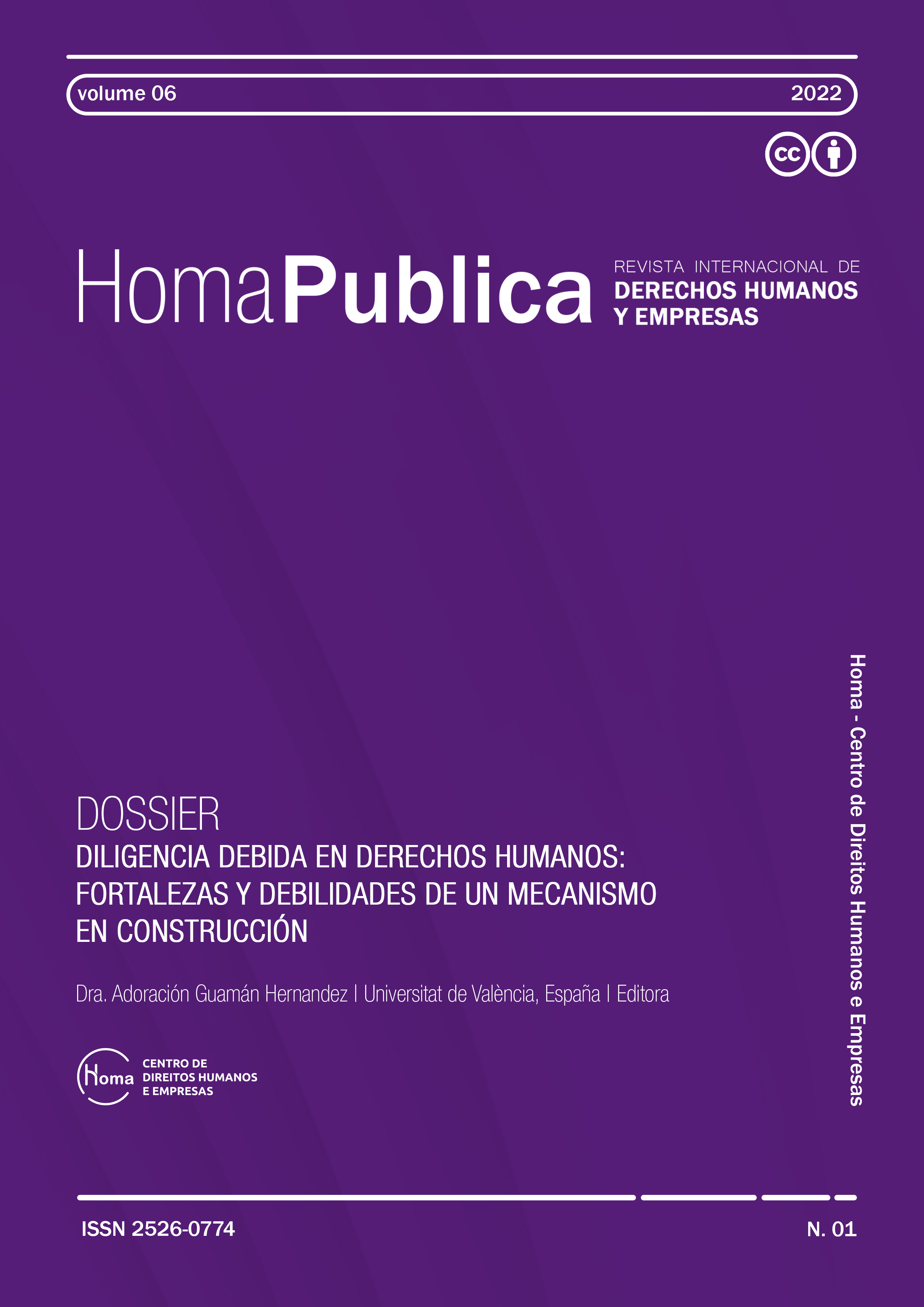Avaliação de Impactos para Due Diligence em Direitos Humanos: Contexto geral e Proposições Metodológicas
Publicado 2022-06-29
Palavras-chave
- Due Diligence,
- Mineração,
- Avaliação de Impactos,
- Metodologia
Como Citar
Copyright (c) 2022 Homa Publica - Revista Internacional de Derechos Humanos y Empresas

Este trabalho está licenciado sob uma licença Creative Commons Attribution 4.0 International License.
Resumo
O presente artigo recupera parte do debate sobre Due Diligence em Direitos Humanos - DDDH, constituído especialmente após a aprovação dos Princípios Orientadores sobre Direitos Humanos e Empresas (ONU, 2011). Tal recuperação, tendo em vista a experiência dos autores, possui remetimentos específicos para o setor da mineração, ainda que não se restrinja a ele. Refletindo sobre as potencialidades e limitações das DDDHs no momento atual, o artigo propõe um modelo prático para o cumprimento de uma das fases essenciais desse processo, a saber, a avaliação dos impactos reais e potenciais identificados por tais Diligências.
Downloads
Referências
- Banco Mundial. (2013). Report. The Human Rights Impact Assessment Report, [S. l.].
- Börzel, Tanja A.; Honke, Jana. (October, 2011). From Compliance to Practice: Mining Companies and the Voluntary Principles on Security and Human Rights in the Democratic Republic of Congo. SFB-Governance Working Paper Series, Berlin.
- Comissão Europeia (União Europeia). (23 fev. 2022). Proposta de diretiva do Parlamento Europeu e do conselho: relativa ao dever de diligência das empresas em matéria de sustentabilidade e que altera a Diretiva (UE) 2019/1937, Bruxelas, n. 0051.
- Corporate Human Rights Benchmark (CHRB). (2019). Benchmark. CHRB Core UNGPs Indicator Assessment, [S. l.].
- Danish Institute Of Human Rights (DIHR). (2016, 2020). The Human Rights Impact Assessment Guidance, [S. l.].
- Deva, Surya. (2013). ‘Treating Human Rights Lightly: A Critique of the Consensus Rhetoric and the Language Employed by the Guiding Principles’. In: Deva, S.; Bilchitz, D. (2013). Human Rights Obligations of Business: Beyond the Corporate Responsibility to Respect?. Cambridge University Press, pp. 78–104.
- Gatti, Bernadete Angelina. (2005). Grupo focal na pesquisa em ciências sociais e humanas. Brasília: Liber Livro Editora.
- Hernandez, Adoración Guamán. (Abril, 2022). El borrador de Directiva sobre diligencia debida de las empresas en materia de sostenibilidad: Un análisis a la luz de las normas estatales y de la propuesta del Parlamento Europeo. Trabajo y Derecho, [s. l.].
- International Council On Mining & Metals (ICMM). (2020). Mining Principles: Performance Expectations. [S. l.: s. n.].
- International Finance Corporation (IFC). (2007). Environmental, Health and Safety Guidelines. [S. l.: s. n.].
- Krajewski, Markus; Tonstad, Kristel; Wohltmann, Franziska. (2021). Mandatory Human Rights Due Diligence in Germany and Norway: Stepping, or Striding, in the Same Direction?. Business and Human Rights Journal, [s. l.].
- Merícia, Everton Jubini de; Silveira, Paulo Stuart Angel Jacob da. (mai./ago. 2021). A construção de uma metodologia para reparação de danos socioambientais: o caso do rompimento da barragem de rejeitos de Fundão em Mariana, Minas Gerais. Revista UFMG, [s. l.], 27(2), p. 518-541.
- Nolan, Justine. (2017). Human Rights and Global Corporate Supply Chains: Is Effective Supply Chain Accountability Possible?. In: Deva, S.; Bilchitz, D. Building a Treaty on Business and Human Rights. [S. l.]: Cambridge University Press. p. 238-265.
- Organisation For Economic Co-Operation And Development (OECD). (2018). Due Diligence Guidance for Responsible Business Conduct. [S. l.: s. n.].
- Organisation For Economic Co-Operation And Development (OECD). (2011). Guidelines for Multinational Enterprises. [S. l.: s. n.]. Disponível em: http://mneguidelines.oecd.org/guidelines/. Acesso em 18 mar. 2022.
- Paré, Mona; Chong, Tate. (19 maio 2017). Human rights violations and Canadian mining companies: exploring access to justice in relation to children’s rights. The International Journal of Human Rights, [s. l.]. DOI http://dx.doi.org/10.1080/13642987.2017.1319819. Disponível em: http://www.tandfonline.com/loi/fjhr20. Acesso em: 12 abr. 2022.
- PRI. (2020). Global Industry Standard on Tailings Management. [S. l.: s. n.].
- Ruggie, John Gerard. (2020). The social construction of the UN Guiding Principles on Business and Human Rights. In: Deva, S.; Bilchitz, D. (2020). Research Handbook on Human Rights and Business. Edward Elgar Publishing Limited. UK.
- Santos, Daniela Chimisso dos; Leck, Sara L. (2020). Human rights due diligence and extractive industries. In: Deva, S.; Bilchitz, D. (2020). Research Handbook on Human Rights and Business. Edward Elgar Publishing Limited. UK.
- Taylor, Mark B. (2020). Human rights due diligence in theory and practice. In: Deva, S.; Bilchitz, D. (2020). Research Handbook on Human Rights and Business. Edward Elgar Publishing Limited. UK.
- United Nations (UN). (2011). Guiding Principles on Business and Human Rights. [S. l.: s. n.]. https://www.ohchr.org/documents/publications/guidingprinciplesbusinesshr_en.pdf. Acesso em 18 fev. 2021.
- Zubizarreta, Juan Hernández; Ramiro, Pedro. (October, 2016). Against the "Lex Mercatoria": Proposals and alternatives for controlling transnational corporations. Observatory of multinationals in Latin America (OMAL) & Association Peace with Dignity.

